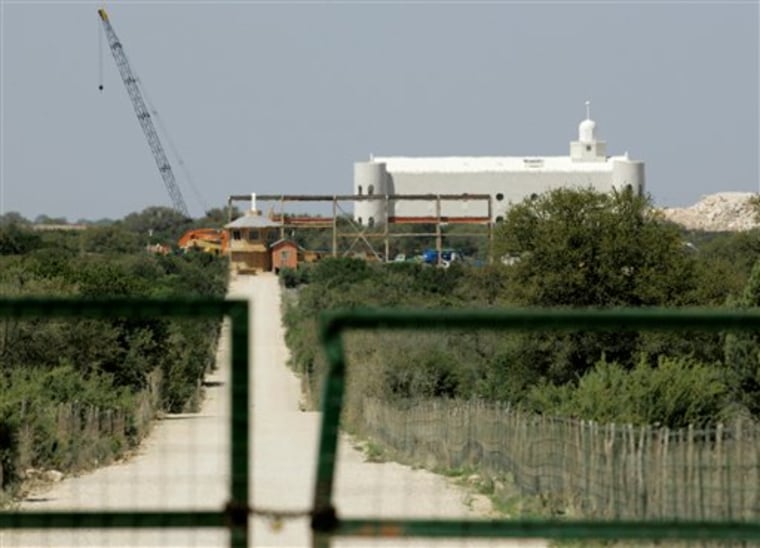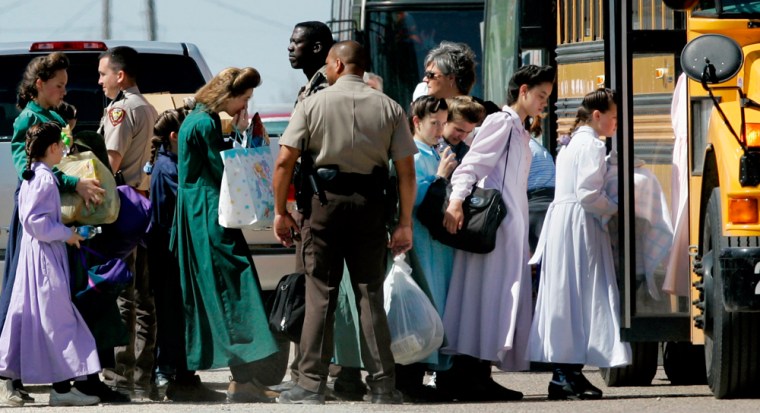All their lives, the girls in the polygamist sect in the West Texas desert were told that the outside world was hostile and immoral, and that venturing beyond the brilliant white limestone walls of their compound would consign them to eternal damnation.
Now, if the state gets its way, hundreds of the girls could be put in foster homes, in what could be a wrenching cultural adjustment that may require intensive counseling.
"What they are up against is having to deprogram an entire community," said Margaret Cooke, who left the sect with seven of her eight children near the end of 1994. The children "are so naive and they have been sheltered to the point that they don't even trust their own judgment."
Marleigh Meisner, a spokeswoman for the state Children's Protective Services, said the agency is working with mental health and other experts to make the children's transition as easy as possible.
‘Cyanide poisoning documents’
Meanwhile, in court papers unsealed Friday, authorities said they found a "cyanide poisoning document" in their search of the compound in the town of Eldorado. But the 80-page list of items seized gave no further explanation.
Texas Department of Public Safety spokeswoman Tela Mange said the document consisted of pages torn out of a first-aid book on how to treat cyanide poisoning. But she said she didn't know why the sect would have such information on hand.
Child welfare officials seized more than 400 children, most of them girls, in the raid on the compound of the Fundamentalist Church of Jesus Christ of Latter Day Saints, saying the youngsters were in danger of physical, emotional and sexual abuse.
Married at puberty
The renegade Mormon splinter group requires girls at puberty to enter into polygamous marriages with much older men and produce children, authorities say. The sect also teaches children to fear the outside world, including the very authorities who removed them until a court hearing Thursday that will help determine their future.
"You're taught to fear everyone and everything," said Cooke, herself a 16-year-old bride.
The children and the 139 women who followed them voluntarily out of the compound are being so secretive that child welfare officials are having trouble sorting out who the youngsters' parents are.
Most of the children are the offspring of the faith's inner circle — including its now-imprisoned prophet, Warren Jeffs — who were born since construction began on the compound in 2003, or were hand-selected by Jeffs to come to the enclave, which the sect regards as part of Zion on Earth.

No use to God over age 6?
In 2003 and 2004, Jeffs, the spiritual leader of an estimated 6,000 followers in two adjoining towns along the Utah-Arizona line, plucked children under the age of 6 to bring to Texas without their parents, former sect member Isaac Wyler said.
"Over age 6 they were too contaminated for the world to be of use to God," said Wyler, who still lives in Colorado City, Ariz., and has 38 siblings. "He picked the ones that would be the most obedient, the ones that would be qualified to go to Zion."
Authorities raided the Eldorado ranch April 3 after a girl from the clan made a whispered telephone call for help to a family violence shelter. The 16-year-old, who indicated she was a few weeks' pregnant, accused her 50-year-old husband of rape and physical abuse. The girl has not yet been identified among the 416 children and may not even be among them.
In the call, the girl said that sect members warned her that if she ever left, outsiders would hurt her and force her to cut her hair, wear makeup and have sex with many men.
Most of the sect's children have never attended public schools or worn modern clothing. The girls wear long, pioneer-style dresses and keep their long hair pinned up in braids.
Extensive genealogical records
In their search of the compound, police uncovered dozens of journals and other documents that contain birth, marriage and other genealogical records. That may help social workers match children with their parents.
The hearing next Thursday will determine whether the state gets full custody of the children or whether they can return to the compound in Eldorado.
The women and children are being held at Fort Concho and at the nearby Wells Fargo Pavilion. Men from the Yearn For Zion ranch and any other relatives are not being allowed to visit.
"I think under the circumstances the folks are as happy in their environment as they can possibly be," said Kevin Dinnin, of the Texas governor's Division of Emergency Management, at a news conference Friday.
Keeping siblings, moms together
Beyond the basic needs of food, water, showers and bedding, Dinnin said, his agency has worked to provide toys and address the unique clothing and laundry needs of the FLDS members, who wear long underwear for religious purposes that are not meant to be seen by outsiders.
The educational needs of the children are being assessed, as are medical needs, including the treatment of about a dozen children with chicken pox and some who need prescription medications, he said. Mental health services are also being provided.
"We have encouraged sibling groups and mothers to stay together," Dinnin said of the living arrangements.
More than 500 people are working with those in the shelter, and the agency is spending $25,000 to $35,000 daily on their care, Dinnin said.
